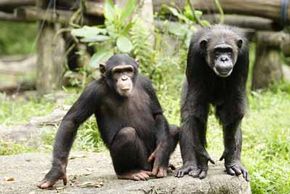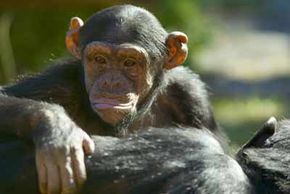Quck answer
Chimpanzees, like all living organisms, are constantly evolving through natural selection. However, the rate and direction of their evolution is influenced by a variety of factors, including habitat destruction and fragmentation, hunting, and disease. Recent studies have shown that chimpanzees in some regions are developing genetic adaptations to their changing environments, such as resistance to certain diseases. However, these adaptations may not be enough to counteract the threats they face, and conservation efforts are still necessary to ensure the survival of this endangered species.
Wild Animals

Scientists have discovered that chimpanzees share 96 percent of their DNA with humans. This suggests that humans and chimpanzees may have evolved from a common ancestor around 4 million years ago, a more recent estimate than the previous timeframe of 5 to 7 million years. It took about 4 million years for humans and chimpanzees to become completely separate species. Observing chimps offers insights into the way humans may have evolved. Recent research has provided scientific evidence of a long-suspected theory about human evolution through a new, significant observation of chimp behavior.
Chimpanzees are known to use tools, documented by scientific studies, including Jane Goodall’s famous work with chimpanzees in Tanzania. However, observing chimps outside of Tanzania has been difficult as they are not accustomed to human presence. Jill Pruetz of IowaВ State University and Paco Bertolani from the University of Cambridge successfully observed chimpanzees in Fongoli, Senegal, from March 2005 to July 2006. Their work revealed documentation of chimpanzees using tools to kill animals for food.
Crucial Female Roles

Some scientists believe that chimpanzees are evolving in the wild.
The research team observed a step-by-step process of fashioning a spear, which involved breaking off a live tree branch, usually about 2 feet (0.6 meters) long, and removing any leaves and twigs. In many cases, the chimps scraped off some of the bark at one end of the stick and created a pointed end by gnawing away at the tip with their incisors. This observation supports the case that the chimps are creating a spear, as no one has seen a chimp sharpen a stick to use it to enlarge a hole in a log.
According to a recent study, chimpanzees in Senegal have been observed using sticks as spears to hunt for bushbabies. The chimps would jab the stick into a hollow tree branch or hole where the bushbaby sleeps during the day. Although they were only successful in catching a bushbaby once out of 22 observed cases, the researchers noted that the chimps would often jab wildly and then pry open the hole from a distance to immobilize or kill the animal. The study also suggests that female chimpanzees may be the primary innovators in tool use, with adolescent females passing down their adaptations to the young of the group. These latest observations of female-dominant tool innovation in a chimpanzee community could provide insight into the theory of female-driven tool innovation in human evolution. To learn more about chimpanzees and evolution, check out the related articles and sources provided.
FAQ
1. Are chimpanzees still evolving?
Yes, chimpanzees are still evolving in the wild. In fact, all living organisms are constantly evolving to adapt to changes in their environment and to survive. Evolution is a slow process, but it is always happening.
2. How are chimpanzees evolving?
Chimpanzees are evolving through natural selection, which means that individuals with traits that give them an advantage in their environment are more likely to survive and pass on their genes to their offspring. For example, chimpanzees with genes that make them better at finding food or avoiding predators are more likely to survive and reproduce.
3. What kind of changes are we seeing in chimpanzees?
Some of the changes we are seeing in chimpanzees include changes in body size and shape, changes in behavior, and changes in diet. For example, some chimpanzee populations have developed larger teeth and jaws to better process tough foods like nuts and seeds.
4. How do scientists study chimpanzee evolution?
Scientists study chimpanzee evolution by comparing the DNA of different chimpanzee populations, observing changes in their behavior and physiology over time, and analyzing the fossil record to understand how chimpanzees have evolved over millions of years.
5. How long does it take for chimpanzees to evolve?
Evolution is a slow process, and it can take millions of years for significant changes to occur in a species. However, smaller changes can occur over shorter periods of time, such as a few hundred or thousand years.
6. Are humans and chimpanzees still evolving in the same way?
Humans and chimpanzees are evolving in different ways because we live in different environments and face different challenges. However, we share a common ancestor and have many similarities in our DNA, so we have evolved along similar paths in the past.
7. Can humans influence chimpanzee evolution?
Humans can influence chimpanzee evolution through habitat destruction and other forms of environmental degradation. When chimpanzee populations lose their habitat or are fragmented by human activities, it can limit their ability to adapt and evolve.
8. How can we protect chimpanzee populations from extinction?
We can protect chimpanzee populations from extinction by preserving their habitat, reducing human-wildlife conflict, and cracking down on illegal hunting and poaching. It is also important to raise awareness about the importance of chimpanzees and their role in the ecosystem.
9. What can we learn from chimpanzee evolution?
Studying chimpanzee evolution can help us understand our own evolution and the factors that have shaped our biology and behavior. It can also help us better understand the relationships between different species and the importance of biodiversity.
10. What is the future of chimpanzee evolution?
The future of chimpanzee evolution is uncertain, as it depends on many factors such as habitat loss, climate change, and human activities. However, scientists are working to understand how chimpanzees are adapting to these challenges and what we can do to help them survive and thrive in the wild.





Leave a Reply